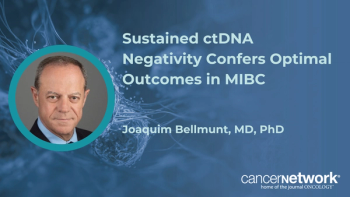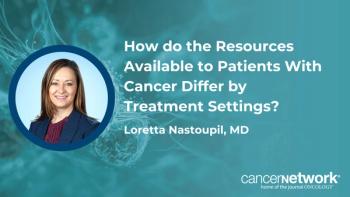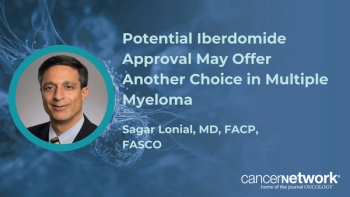
- ONCOLOGY Vol 37, Issue 5
- Volume 37
- Issue 5
- Pages: 216-217
The Complexities and Art of Interpreting Biomarkers and Response to Immune Checkpoint Inhibitors
Ben Kong, PharmD, BCPS, shares a perspective on a study of biomarkers published recently in ONCOLOGY.
A function of immune checkpoint inhibitors, such as PD-1 and PD-L1 inhibitors, is to allow normal tissues to coexist with the immune system and avoid triggering a destructive response. When PD-1 (found on T cells) is bound to PD-L1 (found on normal tissue), it dampens T-cell activation.1 It is now recognized that tumors can also express PD-L1, gaining the ability to escape detection and be allowed to proliferate. Thus, the role of PD-L1 as a biomarker has emerged, and there is interest in the therapeutic opportunity to block the PD-1/PD-L1 interaction.
In 2014, pembrolizumab (Keytruda) was the first PD-1 inhibitor to receive FDA approval for use in melanoma. This was further expanded in 2017 and 2020 to tumors with microsatellite instability–high status and tumor mutational burden (TMB) greater than 10 mut/Mb, respectively. Since then, other PD-1/PD-L1 inhibitors have been approved in various diseases, such as nivolumab (Opdivo), atezolizumab (Tecentriq), avelumab (Bavencio), and durvalumab (Imfinzi). When a response is seen, it tends to be durable and prolonged. Regarding immune-related adverse effects, they can affect any organ system and lead to reactions such as rash, diarrhea, endocrinopathies, musculoskeletal pain, pneumonitis, and more.
The authors of “
Among the antibodies available to assess PD-L1 expression, 4 are associated with the clinical indication (eg, 22C3/pembrolizumab, 28-8/nivolumab, SP263/durvalumab, and SP142/atezolizumab). When interpreting PD-L1 IHC, a number of additional factors need consideration besides the PD-L1 clone, such as the control, tissue fixation, adequate number of tumor cells, and PD-L1 scoring method (tumor proportion score, combined positive score, tumor cell/ immune cell).2,3
The TMB captures somatic alterations within a genomic sequence, and higher values are associated with response to immune therapy. Although the standard method to determine TMB is generally derived from whole exome or genome sequencing, it is not routinely performed due to cost and turnaround. Instead, targeted panels are widely adopted and used to identify oncogenic mutations and estimate TMB. Because of the potential discrepancy, a study explored the performance of panel-based assay compared with whole exome sequencing and observed that variabilities exist among the 11 participating laboratories, leading to either underestimation or overestimation of TMB—likely due to differences in panel size and bioinformatic algorithms.4
The RECIST Working Group has provided guidance in defining and measuring responses to cancer therapies. Unlike traditional therapies, immune modulators tend to have a different pattern of response, which led to the development of iRECIST.5 Specifically, immune modulators can elicit either a delayed clinical response or pseudoprogression—the latter being a phenomenon in which the initial imaging assessment may show new lesions or existing tumors that appear larger, followed by a delayed clinical response. The distinction between pseudoprogression and true progression remains a challenge, so it is currently recommended to continue treatment until the next imaging assessment.
Moving forward, a future toward standardization of analytical methods and interpretation would assist in reducing certain aspects of heterogeneity that are naturally inherent in studies. Doing so would pave the way to better understanding the predictive potential of biomarkers and identifying the patient who may benefit the most from treatment.
DISCLOSURES: Kong is a consultant for Clarified Precision Medicine.
AFFILIATIONS: Oregon Health & Science University and Oregon Health & Science University Knight Cancer Institute
CORRESPONDING AUTHOR(S):
Ben Kong, PharmD, BCPS
Clinical Pharmacy Specialist
Oregon Health & Science University
Email: kong@ohsu.edu
ORCID: 0000-0002-9019-6961
References
- Sharpe AH, Wherry EJ, Ahmed R, Freeman GJ. The function of programmed cell death 1 and its ligands in regulating autoimmunity and infection. Nat Immunol. 2007;8(3):239-245. doi:10.1038/ni1443
- Chebib I, Mino-Kenudson M. PD-L1 immunohistochemistry: clones, cutoffs, and controversies. APMIS. 2022;130(6):295-313. doi:10.1111/apm.13223
- Prince EA, Sanzari JK, Pandya D, Huron D, Edwards R. Analytical concordance of PD-L1 assays utilizing antibodies from FDA-approved diagnostics in advanced cancers: a systematic literature review. JCO Precis Oncol. 2021;5:953-973. doi:10.1200/PO.20.00412
- Merino DM, McShane LM, Fabrizio D, et al; TMB Harmonization Consortium. Establishing guidelines to harmonize tumor mutational burden (TMB): in silico assessment of variation in TMB quantification across diagnostic platforms: phase I of the Friends of Cancer Research TMB Harmonization Project. J Immunother Cancer. 2020;8(1):e000147. doi:10.1136/jitc-2019-000147
- Seymour L, Bogaerts J, Perrone A, et al; RECIST Working Group. iRECIST: guidelines for response criteria for use in trials testing immunotherapeutics. Lancet Oncol. 2017;18(3):e143-e152. doi:10.1016/S1470-2045(17)30074-8. Published correction appears in Lancet Oncol. May 20, 2019
Articles in this issue
Newsletter
Stay up to date on recent advances in the multidisciplinary approach to cancer.



















































